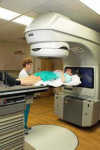The Facts About Prostate Cancer

(NewsUSA) - This year, more than 232,000 Americans will be diagnosed with prostate cancer, making it the most common cancer among males. If caught early, prostate cancer is very treatable and usually curable.
There often are no signs of the disease, but some patients may notice changes in urinary flow, pain when urinating and blood in the urine. At routine physicals, doctors usually take blood to check your level of prostate specific antigen (PSA). If your PSA level is high, your doctor will remove a small piece of tissue from your prostate to look for cancer.
If you are diagnosed with cancer that has not spread from the prostate, the main treatments are external beam radiation therapy, brachytherapy and surgery. Hormone therapy may be added to radiation therapy to shrink the gland. Hormone therapy stops your body from producing hormones that stimulate the growth of new cancer cells.
Sometimes, a combination of treatments is the best way to deal with this type of cancer. Here is an overview of the most common approaches.
* External beam radiation therapy: During this treatment, a radiation oncologist aims radiation at the tumor to destroy the cancer cells. Treatments are painless, last about 30 minutes and are scheduled five days a week for several weeks. You may be able to continue your normal routines during radiation treatments.
* Brachytherapy: Often called "seed implants," this treatment involves placing radioactive sources in or just next to the tumor to kill the cancer cells. The sources may be left in place permanently or temporarily, depending on the type of cancer and the seeds used.
* Surgery: A doctor operates to remove the cancerous prostate.
* Watchful waiting: If you have a very slow growing type of cancer, you may be able to monitor your condition and not undergo any treatment. This option is for older men or men who have other health conditions.
Before undergoing any treatment, talk with several cancer specialists, including a radiation oncologist, about the options available to you.
